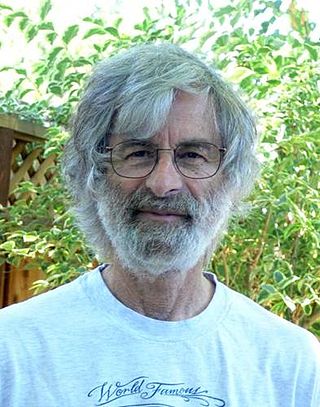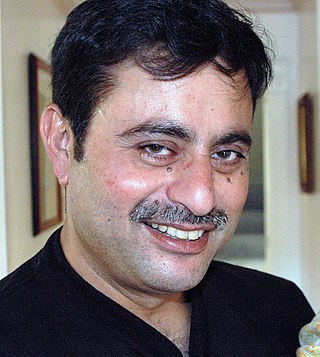
In formal language theory, a context-free grammar (CFG) is a formal grammar whose production rules can be applied to a nonterminal symbol regardless of its context. In particular, in a context-free grammar, each production rule is of the form
In formal language theory, a context-free language (CFL), also called a Chomsky type-2 language, is a language generated by a context-free grammar (CFG).

A finite-state machine (FSM) or finite-state automaton, finite automaton, or simply a state machine, is a mathematical model of computation. It is an abstract machine that can be in exactly one of a finite number of states at any given time. The FSM can change from one state to another in response to some inputs; the change from one state to another is called a transition. An FSM is defined by a list of its states, its initial state, and the inputs that trigger each transition. Finite-state machines are of two types—deterministic finite-state machines and non-deterministic finite-state machines. For any non-deterministic finite-state machine, an equivalent deterministic one can be constructed.
In theoretical computer science and formal language theory, a regular language is a formal language that can be defined by a regular expression, in the strict sense in theoretical computer science.

In theoretical computer science and mathematics, the theory of computation is the branch that deals with what problems can be solved on a model of computation, using an algorithm, how efficiently they can be solved or to what degree. The field is divided into three major branches: automata theory and formal languages, computability theory, and computational complexity theory, which are linked by the question: "What are the fundamental capabilities and limitations of computers?".

Alfred Vaino Aho is a Canadian computer scientist best known for his work on programming languages, compilers, and related algorithms, and his textbooks on the art and science of computer programming.

Leslie B. Lamport is an American computer scientist and mathematician. Lamport is best known for his seminal work in distributed systems, and as the initial developer of the document preparation system LaTeX and the author of its first manual.
In computer science, an ambiguous grammar is a context-free grammar for which there exists a string that can have more than one leftmost derivation or parse tree. Every non-empty context-free language admits an ambiguous grammar by introducing e.g. a duplicate rule. A language that only admits ambiguous grammars is called an inherently ambiguous language. Deterministic context-free grammars are always unambiguous, and are an important subclass of unambiguous grammars; there are non-deterministic unambiguous grammars, however.
In the theory of computation and automata theory, the powerset construction or subset construction is a standard method for converting a nondeterministic finite automaton (NFA) into a deterministic finite automaton (DFA) which recognizes the same formal language. It is important in theory because it establishes that NFAs, despite their additional flexibility, are unable to recognize any language that cannot be recognized by some DFA. It is also important in practice for converting easier-to-construct NFAs into more efficiently executable DFAs. However, if the NFA has n states, the resulting DFA may have up to 2n states, an exponentially larger number, which sometimes makes the construction impractical for large NFAs.
Jeffrey David Ullman is an American computer scientist and the Stanford W. Ascherman Professor of Engineering, Emeritus, at Stanford University. His textbooks on compilers, theory of computation, data structures, and databases are regarded as standards in their fields. He and his long-time collaborator Alfred Aho are the recipients of the 2020 Turing Award, generally recognized as the highest distinction in computer science.

Christos Charilaos Papadimitriou is a Greek theoretical computer scientist and the Donovan Family Professor of Computer Science at Columbia University.

Introduction to Automata Theory, Languages, and Computation is an influential computer science textbook by John Hopcroft and Jeffrey Ullman on formal languages and the theory of computation. Rajeev Motwani contributed to later editions beginning in 2000.
In computer science, in particular in automata theory, a two-way finite automaton is a finite automaton that is allowed to re-read its input.
Seymour Ginsburg was an American pioneer of automata theory, formal language theory, and database theory, in particular; and computer science, in general. His work was influential in distinguishing theoretical Computer Science from the disciplines of Mathematics and Electrical Engineering.
Indexed languages are a class of formal languages discovered by Alfred Aho; they are described by indexed grammars and can be recognized by nested stack automata.
In formal language theory, deterministic context-free languages (DCFL) are a proper subset of context-free languages. They are the context-free languages that can be accepted by a deterministic pushdown automaton. DCFLs are always unambiguous, meaning that they admit an unambiguous grammar. There are non-deterministic unambiguous CFLs, so DCFLs form a proper subset of unambiguous CFLs.

The IEEE John von Neumann Medal was established by the IEEE Board of Directors in 1990 and may be presented annually "for outstanding achievements in computer-related science and technology." The achievements may be theoretical, technological, or entrepreneurial, and need not have been made immediately prior to the date of the award.

Rajeev Motwani was an Indian American professor of Computer Science at Stanford University whose research focused on theoretical computer science. He was a special advisor to Sequoia Capital. He was a winner of the Gödel Prize in 2001.

In automata theory, DFA minimization is the task of transforming a given deterministic finite automaton (DFA) into an equivalent DFA that has a minimum number of states. Here, two DFAs are called equivalent if they recognize the same regular language. Several different algorithms accomplishing this task are known and described in standard textbooks on automata theory.
In computer science, the Method of Four Russians is a technique for speeding up algorithms involving Boolean matrices, or more generally algorithms involving matrices in which each cell may take on only a bounded number of possible values.










